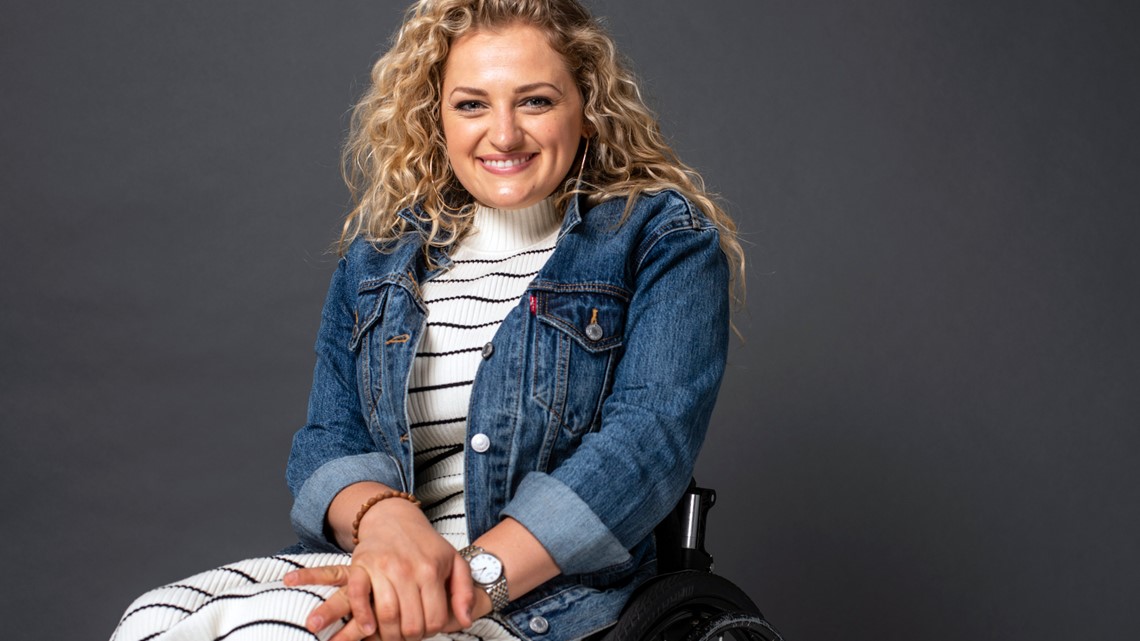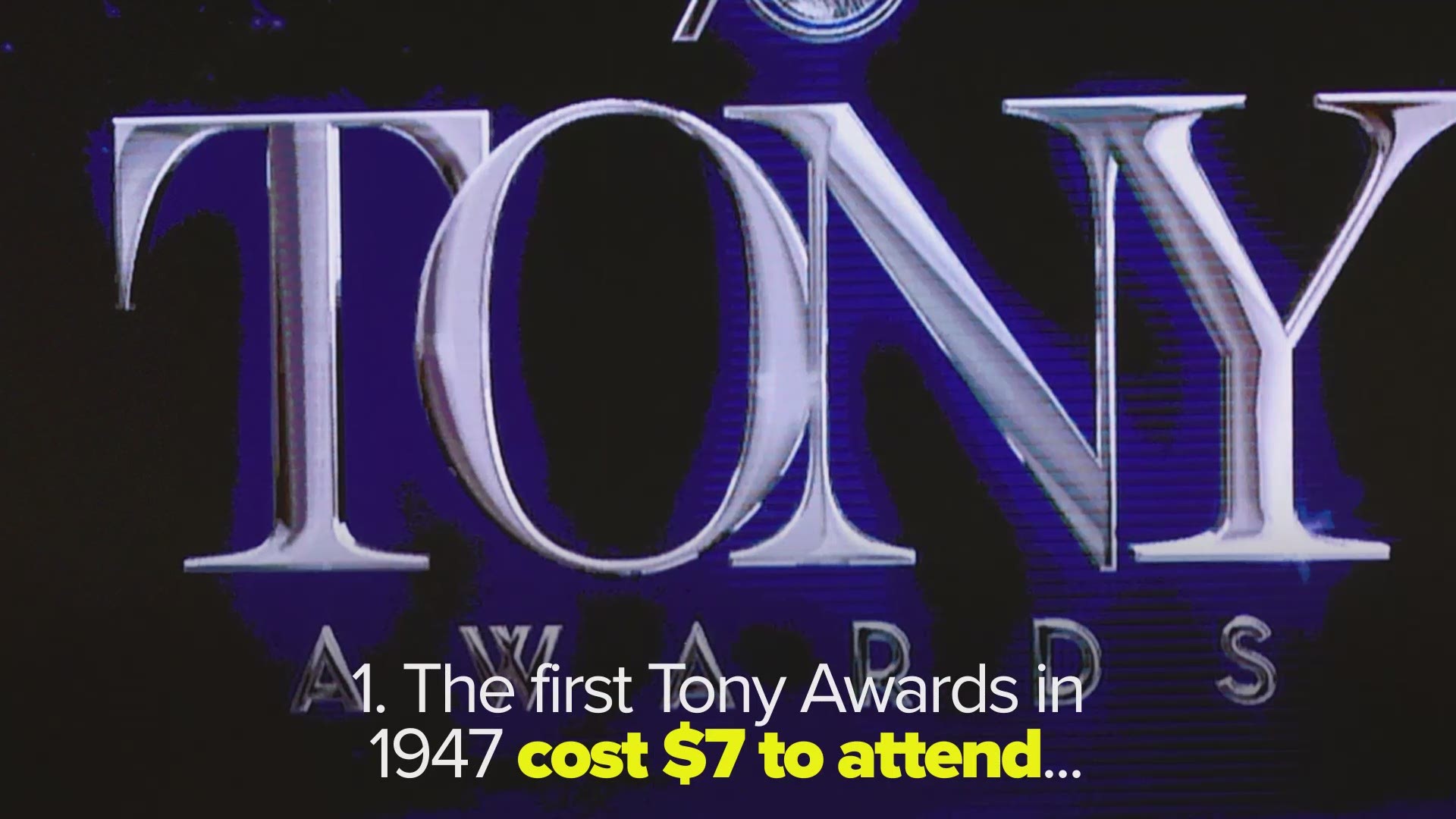When she sings, Ali Stroker says, she has "no limitations."
That was clear on Sunday as Stroker performed and made history as the first actor in a wheelchair to capture a Tony Award. She earned the trophy for her portrayal of Ado Annie in Daniel Fish's dark revisionist revival of the Rodgers and Hammerstein classic "Oklahoma!"
"This award is for every kid who is watching tonight who has a disability, who has a limitation or a challenge, who has been waiting to see themselves represented in this arena," Stroker, who won for best featured actress in a musical, said on stage. "You are."
Stroker booked her first musical theater gig at the tender age of 7. She was cast as the title role in "Annie" in a friend's backyard production in a New Jersey beach town.
And since Stroker was in a wheelchair, Little Orphan Annie was also in one.
"When I began to sing, I just felt so free. There was like no limitation," she says. "I was used to people staring at me, being a little girl in a wheelchair. But being onstage and the way people were looking at me, it was so different. And I knew that was what I wanted to do with the rest of my life."
Flash forward a few years and Stroker made musical theater history, thanks to her amazing voice, acting chops and some unconventional casting decisions. wheelchair to win a Tony.
She won for her role as a different Annie — Ado Annie, in a radical remake of the class musical "Oklahoma!"
Paralyzed from the chest down due to a car crash when she was 2, Stroker already made history in 2015 as the first Broadway actor who used a wheelchair. She advocates for equal access and disabled rights, and loves it when she sees disabled fans in the theater, but she hopes her talent gets attention, too.
"I think the coolest part is to see somebody whose eyes light up and to hear them say, 'I've never seen myself represented onstage. But, more than that, you're so good,'" she says. "I don't want it to just be the inspiration. I am for some people but I just want to be the best in my field."
This production of "Oklahoma!" brings out the show's darkness and edginess. Stroker calls "I Cain't Say No," sung by Ado Annie, "an anthem for living your life to the fullest."


"Growing up, I never saw disability and sexuality together, talked about, represented. And this was just such an important moment for me because I think the most effective way to deal with disability onstage and to deal with sexuality onstage is not to talk about it but to do it," she says.
"We give permission to the audience to just watch and observe and learn. And I think that in society we so often are told, don't stare, don't look, don't point and don't ask because it would maybe make somebody uncomfortable."
Stroker, 31, grew up in Ridgewood, New Jersey, where music, particularly cast albums, played a role in her rehabilitation. She saw her first Broadway show — "Beauty and the Beast" — in first grade, and did theater in summers and high school. If she wasn't cast in a role, she did hair or makeup.
As with most young singers, Stroker learned to sing by imitating. To belt, she mimicked Sherie Rene Scott. To hit her upper range, she listened to Kristin Chenoweth. (Chenoweth recently stopped by backstage at "Oklahoma!" to offer her congratulations. "I just feel like I owe her something maybe because she was such an influence in my life," says Stroker.)
After graduating from New York University, Stroker was in "The 25th Annual Putnam County Spelling Bee" at the Paper Mill Playhouse in New Jersey, as well as "The Glee Project" and "Glee" on TV. She made her Broadway debut in a revival of "Spring Awakening."
Since her breakthrough, other actors with disabilities have followed her onstage in New York. Jamie Brewer, who starred in the off-Broadway play "Amy and the Orphans," is thought to be the only known performer with Down syndrome to play the lead in an off-Broadway or Broadway production. In 2017, Madison Ferris, an actress with muscular dystrophy, was cast as Laura Wingfield in a Broadway revival of "The Glass Menagerie."
Stroker believes it's high time the disabled are represented on stages and sound stages authentically, noting that one in five Americans lives with a disability.
She's against able-bodied actors being cast in disabled roles, preferring that casting agents widen their search. "We don't cast people and put them in blackface. It's completely inappropriate. I feel the same way about disability," she says.
And Stroker also isn't a fan of roles written specifically for people with disabilities: "It doesn't feel honest that my story is all about being in a wheelchair. That feels boring."
Instead, she pushes for disabled representation in writers' rooms and behind the camera, and asks that the best actors get cast, whether the roles call for a disabled person or not.
She also has a message to fellow actors with disabilities: "Our job is not just to represent. Our job to be the best actor in the room. Because the truth is I don't want a job because I'm in a wheelchair. I want a job because I'm the best actor for the role."
In the middle of the Tony Award hype, Stroker says she relies on her parents and boyfriend as her "support system," and conserves her energy. She craves eight hours of sleep, plenty of water and good food. When she describes herself, the chair she's sitting in doesn't get mentioned.
"I'm just a girl from New Jersey who loves to sing. I love the beach. I'm a theater rat and I like challenges," she says. "Because I've never had any other choice."

